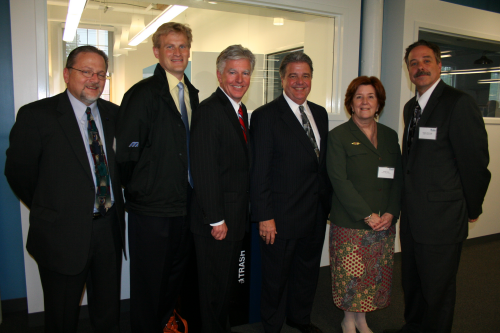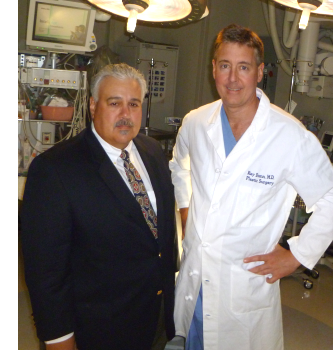
UMass and M2D2 leaders convened at the recent M2D2 Open House in Lowell. Pictured left to right are Steven Tello, EdD, assistant professor of management and entrepreneurship at UMass Lowell; Kurt Barringhaus, MD; UMass Lowell Chancellor Marty Meehan, JD; University of Massachusetts President Robert L. Caret, PhD; Sheila Noone, PhD; and Stephen McCarthy, PhD.
Turning a great idea into a product that can be manufactured and sold is never easy. For medical device inventors, the road from concept to commercialization can be especially long and arduous, as they must navigate medical feasibility and regulatory requirements as well as the usual challenges of obtaining financial and human resources to bring a product to market. The Massachusetts Medical Device Development Center (M2D2) was created to help ease the journey for inventors, manufacturers and marketers of innovations in medical technology. In the process, M2D2 contributes to economic development throughout the commonwealth and, ultimately, helps improve patient care.
“Our successful collaborations have yielded important products,” said Sheila Noone, PhD, assistant vice provost for clinical research at UMass Medical School who, along with Stephen McCarthy, PhD, professor of plastics engineering at UMass Lowell, is co-director of M2D2. “M2D2 connects people with the right UMass resources for development of their idea—and is sometimes a necessary reality check for them as they learn about the regulatory and clinical pathways.”
Inventions whose journeys from concept to market are being assisted by M2D2 include a miniature blood pressure sensor for invasive cardiovascular monitoring, improved ergonomic scalpel designs, innovation in automated assessment of microbiopsies, and new technology to determine rates of fracture healing.

UMMS faculty member Raymond Dunn, MD, (right) and business partner Anthony Raymond launched 5G Medical to develop and market Dr. Dunn’s patented ergonomic scalpel design with assistance from M2D2.
Established by Dr. Noone and Dr. McCarthy in 2006, M2D2 offers inventors and small medical device companies coordinated access to research, engineering and clinical investigation at the Lowell and Worcester campuses. UMMS brings medical expertise and resources, from initial assessments of device proposals to supporting inventors and manufacturers through the complete life cycle of clinical studies, while its clinical partnership with UMass Memorial Medical Center provides ready access to participants for clinical trials. UMass Lowell contributes its world-renowned engineering expertise and plastics laboratories, as well as incubator facilities, business analysis and planning support for medical device entrepreneurs. Launched with seed grants from the UMass President’s Science and Technology Fund and the Massachusetts John Adams Innovation Institute, M2D2 was awarded $4 million by the Massachusetts Life Sciences Center (MLSC) in 2008.
One of the start-up companies benefiting from M2D2 resources is 5G Medical, founded by Raymond Dunn, MD, professor of surgery and chief of plastic and reconstructive surgery at UMass Memorial, and business partner Anthony Raymond. Started with a $54,000 seed grant from M2D2 to produce a prototype ergonomic scalpel based on Dr. Dunn’s already-patented design, 5G Medical is now developing a business plan and seeking additional grant funding with further assistance from M2D2’s marketing experts and two summer interns funded by the MLSC. “M2D2 is an innovative entity that has filled a critical link in the process,” said Dunn.
While M2D2 welcomes any medical device entrepreneur, its success as a conduit between campuses has spawned collaborations between UMass faculty inventors with overlapping interests. In one example, UMMS cardiologist Kurt Barringhaus, MD, and Xingwei Wang, PhD, assistant professor of electrical and computer engineering at UMass Lowell teamed up to create a miniature intra-arterial blood pressure sensor that will help avoid unnecessary angioplasties, with the goal of cutting costs while improving cardiac care. Other UMMS faculty and clinicians involved with M2D2 include John J. Wixted, MD, assistant professor of orthopedics & physical rehabilitation; Andrew Fischer, MD, professor of pathology and cell biology; Babs Soller, PhD, professor of anesthesiology and surgery; Joyoni Dey, PhD, assistant professor of radiology; and Matthew Gounis, PhD, assistant professor of radiology.
In May, M2D2 welcomed visitors to an open house held at its newly renovated incubator facility in Lowell. Occupying 9,000 square feet, the new facility offers six wet laboratory suites, two office suites, large office spaces, a board room and reception area as well as a break room and open space.
Like the companies it has helped, the new space is concrete evidence of the past success and future promise of M2D2. Noone, who believes that M2D2 helped UMMS win its five-year, $20 million Clinical and Translational Science Award (CTSA) from the National Institutes of Health, also points to the upcoming CTSA-funded infrastructure improvements at UMMS as yet another resource for M2D2 participants.
“Federal and state government want to foster a culture of innovation between the basic and clinical sciences via interdisciplinary work across UMass campuses,” said Noone. “We are demonstrating that we can grow biomedical companies and jobs in Massachusetts.”
Related links:
UMass awards technology development grants
Newsmaker: Guiding cardiac diagnoses
Massachusetts Medical Device Development Center (M2D2)
CTSA News Archive